| Jeremy
Barton L I G H T P R O J E C T S Still at the Core |
||
| Bottom | Contents Page | Introduction |
| This light box has been designed to overcome a number of practical problems associated with previous boxes. Before this I would first build the light box and then think how to display it. This involved building a plinth to stand it on and then having a perspex cover made to fit over it. When we had the last exhibtion, the light work, the plinth and the cover were all independant elements that had to be transported separately and then put together on site. With this box the display elements are designed to fit precisely inside the cover and a small plinth fits neatly onto the base. This way the whole thing is one unit that can be moved about and simply placed on a shelf. |
||
| This general view of the light box shows the base, which contains the light source, the cover made of perspex and the light work itself which glows from within. Light is projected up into the box and illuminates tissue paper stretched across openings in the outer surface. In places one can look through that surface into the interior. | 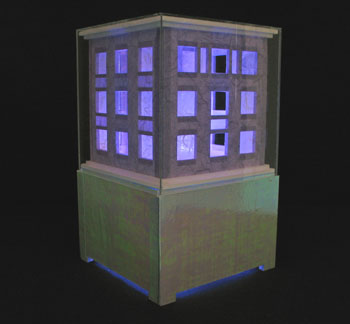 |
||||
| This is the same view but with a different colour. The colour comes not from the tissue, but from the light source which changes colour according to a regular sequence. So the external surfaces and the internal structure taken on different colours over time. | 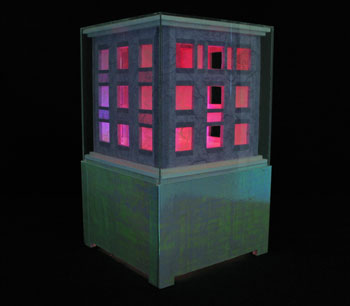 |
||||
| Here you can see the front face of the work and you get an idea of how the external surfaces and the internal properties interact. In some cases one looks at windows that are obscured and take their colour from the light source, but in other cases you see through windows to what is inside. An important element here is the small blue cone. |  |
||||
| This is the same view but
further on in the colour sequence where most of the surfaces have changed from
red to green. The cone however remains blue and there is an interesting
contrast between the changing colours of the surrounding structure and the
static blue of the cone. The blue cone glows with its own light and contrasts at each stage with the light around it. |
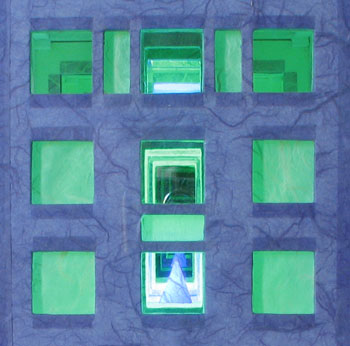 |
||||
| Here again you can see the way the cone interacts with its surroundings. The blue of the cone has a ghostly quality as though out of place in its setting. | 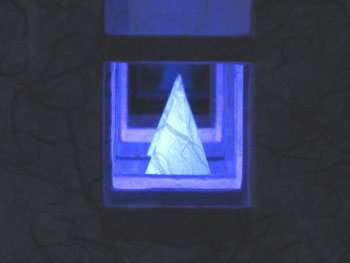 |
||||
| At each change of colour the
cone remains unchanged and yet we see it differently. The blue of the cone is seen in contrast to the colour of its surroundings. |
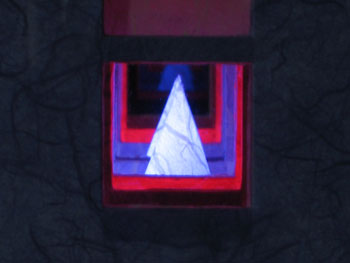 |
||||
 |
|||||
| Above the camera shows three openings
along the bottom row of the work, the outer two have tissue paper covers that
glow with colour and texture. The centre opening looks straight through a
series of internal openings to the back of the piece and the cone. Below you see another three openings, but these all provide views into the interior, views which are difficult to interpret in this flat two dimensional form. The central opening looks at what appears to be a bright blue light. However it is in fact the same blue cone seen from a different angle. So again we get that contrast between the colour of the central object and the colour of its setting. |
|||||
 |
|||||
| These next three photos aim to show something of the interior arrangements of the piece. This is difficult to achieve as the view points are by design limited. When you are actually in front of the piece then it is possible to make some sense of what you see by shifting your point of vision. |  |
||||
| The interior is deliberately obscure, to provide an ambiguous and unsettling experience for the viewer. We look through windows into windows where mirrors redirect the gaze and enlarge our sense of space. | 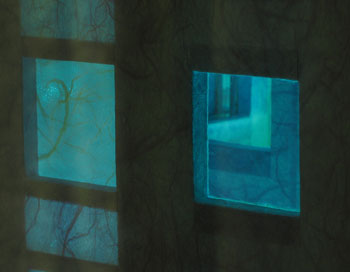 |
||||
| Somewhere inside there is a settled geometry, but the aim of the work is to challenge the viewer and make ambiguity out of order, puzzlement out of certainty, complexity out of a simple box. |  |
||||
| The work is made of foam card covered with tissue paper and situated within a perspex box mounted on a foam card base containing two led lights. Dimensions: 309mm x 208mm x 208mm. |
||
| Intrigued? Confused? Want to know more? Contact me. |
||
| Top | Contents Page | Introduction |